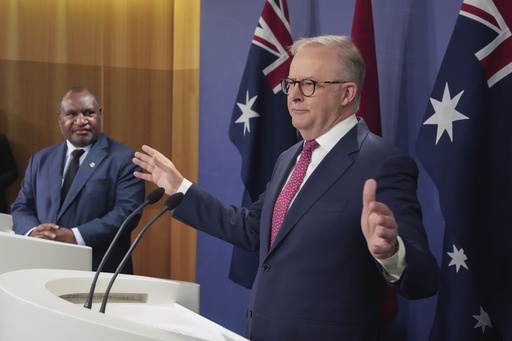MELBOURNE, Australia — In a notable development of soft diplomacy, Papua New Guinea is set to establish its own rugby league team in Australia, a decision linked to efforts aimed at curbing Chinese influence within the South Pacific. This initiative has been marked by an investment from the Australian government amounting to 600 million Australian dollars (around $380 million) over a ten-year period, with the new team expected to debut in the National Rugby League in 2028.
Prime Minister Anthony Albanese of Australia and Papua New Guinea Prime Minister James Marape unveiled the agreement during a press conference in Sydney, where they also announced the formal commencement of a bilateral security agreement that had been established a year earlier. Australia’s concern stems from China’s pursuit of security arrangements with Papua New Guinea and other island nations in the South Pacific, which could potentially destabilize regional security dynamics, as perceived by U.S. allies including Australia.
Rugby league holds a special place in the heart of Papua New Guinea, a nation with a population of approximately 12 million that faces challenges such as poverty, tribal conflicts, and rising rates of violent crime and civil unrest. Marape emphasized the importance of the security deal with Australia, stating that it is crucial for safeguarding the well-being of players and officials situated in the capital, Port Moresby. He remarked, “A player is safe when we have good rapport between our two police forces.”
When questioned about whether this arrangement would prevent Papua New Guinea from forming a security pact with China, Albanese opted not to provide a direct answer. He asserted, “Security in the Pacific is primarily the responsibility of the Pacific family, and this is a principle we share.” Marape highlighted that the security agreement with Australia aligns with his country’s interests, noting that while Australia is their preferred security ally, they still seek to maintain relations with other nations, including China, particularly through trade relations.
The Australian government later clarified that the agreement to create the rugby league team is backed by a “strategic trust” deal between the two nations. This agreement includes provisions that would permit Australia to withdraw its financial support and obligate the National Rugby League to remove Papua New Guinea’s team if that trust is violated, as stated by Pat Conroy, Australia’s Minister for International Development and the Pacific. He also mentioned that Papua New Guinea’s Foreign Minister Justin Tkatchenko had publicly dismissed any prospects of a security arrangement with China.
Peter V’landys, the chair of the Australian Rugby League Commission, asserted that the Papua New Guinea government would be unlikely to jeopardize Australian taxpayer funding for the team by pursuing a security deal with Beijing. “Rugby league is such a religion in Papua New Guinea that they will never take the risk of losing a rugby league team to do a deal with another country,” V’landys expressed.
Marape characterized the establishment of the Port Moresby-based rugby team as a significant step in solidifying the relationship between Papua New Guinea and Australia. The existing security pact, signed by both leaders a year prior, has reinforced Australia’s role as Papua New Guinea’s primary security partner, although the signing was delayed by six months due to unrest in Papua New Guinea sparked by a security agreement between the United States and Marape’s administration. The protests arose from concerns regarding the impact on the nation’s sovereignty triggered by that earlier agreement which had been enacted a month earlier.
